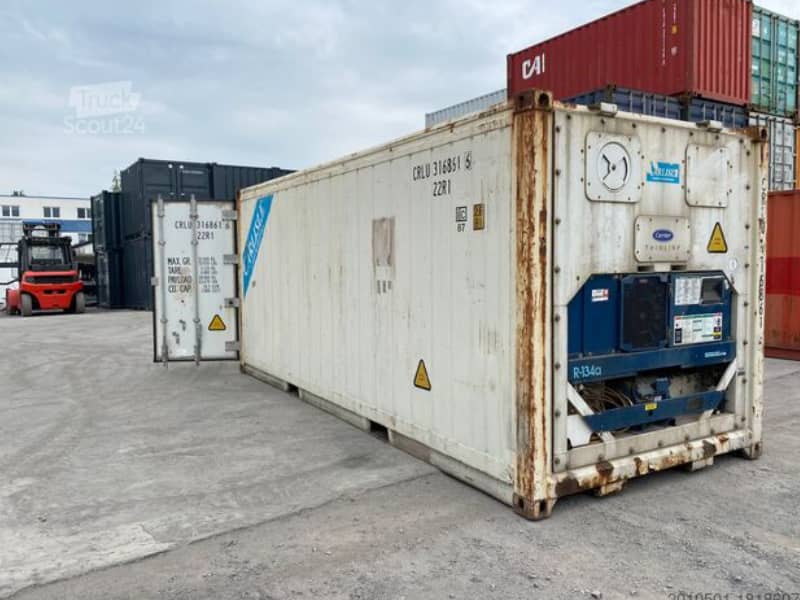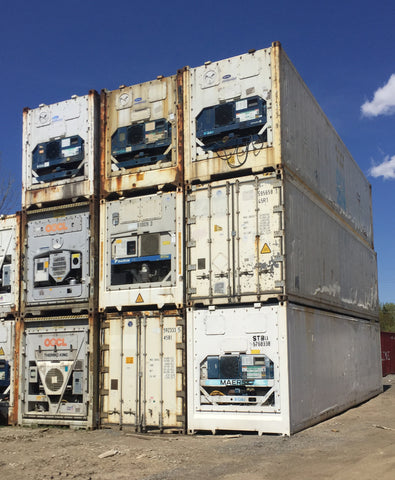All Regarding Freezer Containers: Essential Insights for Your Storage Space Needs
Freezer containers play a crucial role in the conservation of perishable items. They are available in numerous types, consisting of cooled and shielded systems, each made for certain storage demands. Understanding the benefits and vital functions of these containers is essential for services aiming to enhance their procedures. As the demand for reliable storage space services expands, checking out the various alternatives readily available can cause educated choices that affect both profitability and sustainability. What factors should one think about when picking the appropriate container?
Kinds Of Freezer Containers
Freezer containers can be found in various types, each designed to meet specific temperature level control needs. Among one of the most common types are chilled containers, which preserve temperature levels in between 0 ° C to 10 ° C, making them suitable for subject to spoiling products like fruits, veggies, and dairy products. One more type is the deep fridge freezer container, which runs at temperatures below -18 ° C, suitable for long-term storage space of icy things such as meats and fish and shellfish.
Shielded containers supply temperature level security without active cooling, making them useful for short-term transportation of temperature-sensitive items. Furthermore, there are portable freezer devices, which supply adaptability in places and are often utilized in occasions or seasonal procedures. Blast chillers rapidly reduce the temperature level of warm foods, making sure security and quality. Each type serves an unique objective in numerous markets, from food service to drugs, stressing the value of selecting the right container for specific storage space needs.

Advantages of Using Cold Store Solutions

Cold storage space solutions expand the shelf life of things, decreasing waste and raising success for businesses. By effectively handling supply with proper temperature level control, companies can maximize their supply chains and enhance operational performance.
Additionally, cool storage centers permit versatile storage space options, fitting numerous volume demands and seasonal fluctuations popular (used 40ft refrigerated shipping containers). This adaptability assists organizations respond promptly to market changes
Finally, using chilly storage space solutions can ensure conformity with health and wellness and safety and security policies, guarding both companies and customers. Generally, the critical use of cold store boosts item management while promoting sustainability and financial stability.
Trick Features to Search For in Freezer Containers
When picking cold store containers, several key functions quality careful consideration to safeguard peak performance and reliability. Temperature control capacities are vital; containers should preserve regular temperatures appropriate for specific goods. Insulation top quality likewise plays a significant role, as premium insulation minimizes energy consumption and boosts temperature security.
Next off, simplicity of gain access to and loading is essential; containers need to offer easy to use layouts for effective handling and company. Longevity is another vital element; weather-resistant materials ensure longevity and safeguard contents versus ecological elements.
In addition, movement functions, such as integrated wheels or raising points, facilitate transport, while personalized layouts permit customized storage space solutions.
Last but not least, checking systems, including temperature level alarms and remote tracking, provide real-time updates, ensuring that conditions remain perfect. By focusing on these functions, individuals can choose chilly storage space containers that meet their functional demands efficiently.
Choosing the Right Cold Store Container for Your Needs
Picking the right chilly storage container requires a thoughtful analysis of functional needs and certain demands. Elements such as the kind of items being kept, temperature level of sensitivity, and volume needs to be focused on. Disposable food items might demand containers with rigorous temperature level controls, while drugs may require exact problems to preserve effectiveness.
Furthermore, potential individuals should consider the container's dimension and flexibility. A bigger system may be required for mass storage, while smaller, portable alternatives might be ideal for temporary or on-site needs. Insulation quality and power efficiency are likewise vital, as these will certainly influence functional expenses and temperature level stability.
Finally, compliance with industry guidelines and criteria is important, particularly in fields like food and healthcare. By very carefully examining these aspects, customers can choose a cold store container that successfully here meets their one-of-a-kind requirements and warranties optimum storage space problems.
Ideal Practices for Maintaining Cold Storage Issues
Keeping suitable cold store conditions is essential for maintaining the quality and security of temperature-sensitive items. On a regular basis keeping an eye on temperature level and moisture levels is essential; utilizing trustworthy digital thermometers and hygrometers can supply precise analyses. Appropriate insulation of cold storage space containers aids decrease temperature fluctuations and power loss.
Executing a first-in, first-out (FIFO) system ensures that older stock is used prior to more recent supply, reducing waste (used 40ft refrigerated shipping containers). Furthermore, keeping an organized format within the storage room permits better air movement and decreases the threat of cross-contamination
Regular maintenance look at devices, such as compressors and seals, are essential to avoid malfunctions. Team training on ideal methods for filling and unloading items aids maintain temperature level stability. Maintaining doors shut as much as feasible limits warm exchange, assuring that the cold storage environment continues to be effective and steady in maintaining valuable products.
Cost Considerations for Cold Store Solutions
When assessing cold store remedies, it is crucial to consider the first investment costs along with ongoing functional expenses. An extensive failure of these prices can reveal considerable lasting cost savings possibility for companies. Recognizing these monetary aspects aids stakeholders make informed choices concerning their freezer requirements.

First Investment Expenses
The financial landscape of cold store containers offers different first investment costs that companies need to think about. These expenses usually consist of the acquisition or rental price of the containers, which can differ based upon kind, size, and insulation high quality. Additionally, expenses associated with useful content retrofitting existing frameworks to suit freezer needs to be factored in, especially if specialized devices is called for. Installation costs, including electrical work and refrigeration systems, also contribute to the total preliminary investment. Organizations need to not ignore transportation prices for providing containers to their desired area. Possible personalization options, such as shelving or temperature surveillance systems, can further affect the initial monetary investment. Cautious budgeting for these variables is essential for effective cold store implementation.
Operational Expenditures Malfunction
Functional costs for freezer remedies encompass several crucial cost considerations that businesses should browse. Key variables consist of power prices, which can be considerable as a result of the requirement to maintain low temperatures. Maintenance expenditures are additionally significant, as routine servicing is important to ensure equipment operates effectively and continues to be certified with health and wellness and safety standards. Additionally, labor expenses might arise from the demand for specialized personnel to handle and keep track of the storage space atmosphere. Insurance coverage expenditures are another consideration, as companies have to shield their financial investments against possible losses. Any prospective regulative compliance costs have to be factored in, as organizations might require to invest in systems that stick to food safety and ecological policies. Recognizing these costs is essential for effective budgeting.
Long-Term Cost Savings Potential
Purchasing freezer services supplies considerable long-term financial savings capacity, transforming preliminary expenditures right into monetary effectiveness with time. By decreasing putridity and waste, businesses can boost their revenue margins significantly. Advanced insulation and energy-efficient systems decrease utility prices, which collect over the life expectancy of the tools. In addition, cold storage containers often require much less frequent upkeep contrasted to traditional refrigeration techniques, causing lower repair costs. The capacity to store items for prolonged durations without endangering high quality enables businesses to take advantage of on market changes, maximizing profits. Furthermore, the scalability of cold store remedies enables firms to adjust to altering needs without sustaining too much prices. In general, these factors add to a compelling case for chilly storage as a cost-efficient investment method.
Regularly Asked Concerns
How Much Time Can Food Be Kept in Freezer Containers?
The duration food can be stored in cool storage space containers varies by type. Normally, perishable things last from days to weeks, while frozen foods can stay secure for months, depending on appropriate temperature and storage space problems.
Are Cold Store Containers Energy-Efficient?
The power efficiency of freezer containers varies based on style and insulation high quality. Modern systems usually use sophisticated technology to decrease power intake, inevitably contributing to reduced operational prices and ecological effect in long-lasting usage.
Can Freezer Containers Be Customized for Specific Needs?
Cold storage space containers can indeed be customized to fulfill details requirements. Alterations might consist of temperature controls, size changes, and added functions, allowing users to customize options successfully for different storage needs and operational preferences.
What Are the Usual Dimensions of Cold Store Containers?
Cold storage space containers commonly this post can be found in common sizes such as 10, 20, and 40 feet. These dimensions suit different storage needs, making sure versatility for businesses requiring temperature-controlled environments for sensitive materials or subject to spoiling products.
Do Freezer Containers Require Unique Permits for Usage?
Cold store containers often call for special licenses for use, depending upon local guidelines and intended applications. Authorities might mandate permits to ensure safety requirements, ecological compliance, and correct operational methods are maintained during their application.
Cold storage containers come in numerous types, each created to fulfill particular temperature level control needs. Furthermore, cool storage facilities permit for flexible storage choices, suiting various volume demands and seasonal fluctuations in demand. Selecting the right cold storage space container calls for a thoughtful assessment of operational demands and certain demands. The financial landscape of cool storage space containers offers various first financial investment prices that companies need to take into consideration. Cold storage space containers can indeed be customized to satisfy certain requirements.